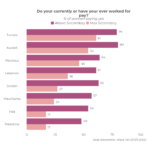Did the Egyptian protests lead to political change? I examine the effects of the first and second waves of Egyptian protests that started in 2011, on voting outcomes during Egypt’s first free Presidential elections that took place between May and June 2012. I geocoded the “martyrs” – demonstrators who died during the protests – using unique information from the Statistical Database of the Egyptian Revolution and exploited the variation in districts’ exposure to the Egyptian protests. Using official elections’ results collected from the Supreme Presidential Electoral Commission (SPEC) and controlling for districts’ characteristics using Census data, I find suggestive evidence that higher exposure to protests’ intensity leads to a higher share of votes for former regime candidates, both during the first and second rounds of Egypt’s first presidential elections after the uprisings. From the period of euphoria following the toppling of Mubarak to the sobering realities of the political transition process, I find that protests led to a conservative backlash, alongside negative economic expectations, general dissatisfaction with government performance, decreasing levels of trust towards public institutions, and increasing recognition of limitations on civil and political liberties.
Visit External SiteTopics
- Charity2
- Corruption113
- COVID-1969
- Democracy35
- Discrimination13
- Economy225
- Education51
- Environment36
- Extremism19
- Freedoms50
- Gender Issues159
- Governance253
- Health44
- International Relations192
- Labor Market34
- Media31
- Migration63
- Political Institutions213
- Political Participation33
- Political Systems60
- Refugees6
- Religion118
- Security31
- Social Justice44
- Wellbeing2
- Youth75


